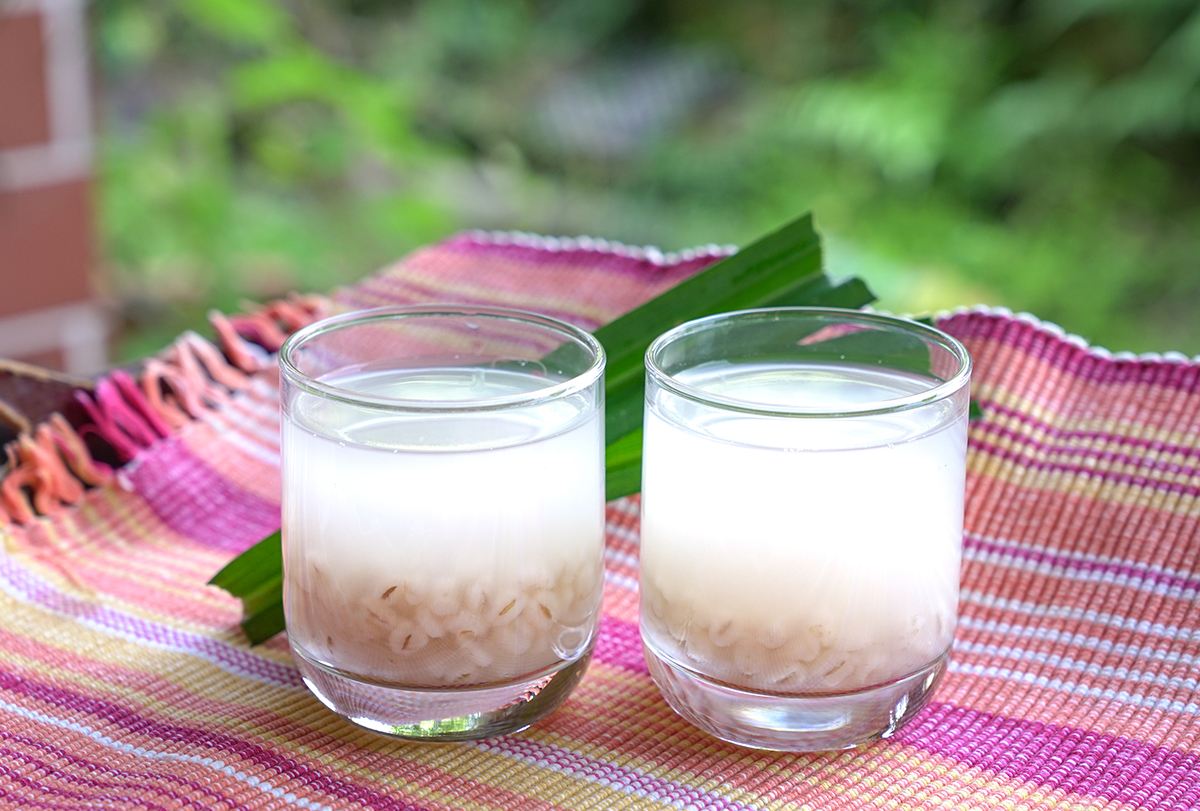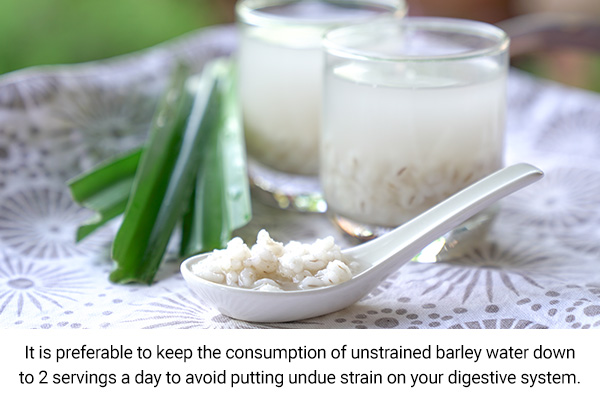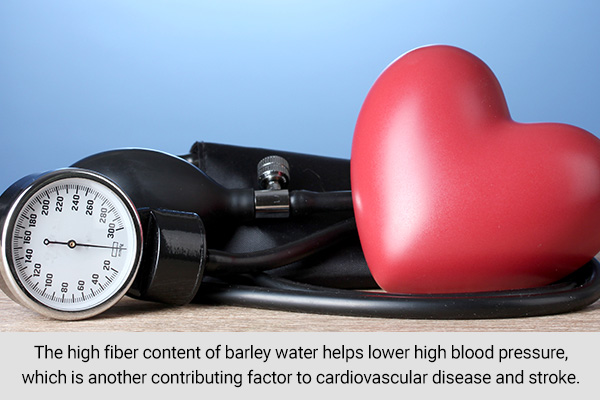In this article:
Barley is a whole grain replete with a number of nutrients such as vitamin B complex, iron, calcium, magnesium, manganese, selenium, zinc, copper, protein, amino acids, dietary fiber, beta-glucans, and various antioxidants.

It is on account of this nutritional makeup that barley has several health-promoting attributes to boot. You can tap into these versatile health benefits not just by including the wonder grain in your diet but also by using it to prepare a nourishing tonic called barley water.
Nutritional Content of Barley
Nutritional value of pearled barley per 100 grams: (1)
| Nutrient | Quantity | Amount |
|---|---|---|
| Water | g | 10.09 |
| Energy | kcal | 352 |
| Protein | g | 9.91 |
| Total lipid | g | 1.16 |
| Carbohydrate | g | 77.72 |
| Fiber | g | 15.6 |
| Sugars | g | 0.8 |
| Calcium, Ca | mg | 29 |
| Iron, Fe | mg | 2.5 |
| Magnesium, Mg | mg | 79 |
| Phosphorus, P | mg | 221 |
| Potassium, K | mg | 280 |
| Sodium, Na | mg | 9 |
| Zinc, Zn | mg | 2.13 |
| Thiamin | mg | 0.191 |
| Riboflavin | mg | 0.114 |
| Niacin | mg | 4.604 |
| Vitamin B-6 | mg | 0.26 |
| Folate | mcg | 23 |
| Vitamin A | mcg | 1 |
| Vitamin K | mcg | 2.2 |
How to Make Barley Water

Here’s how you can prepare barley water at home.
- Rinse barley under running water, and then soak it in water for at least 4 hours.
- Strain it, and mix 1 cup of the soaked barley in 3 to 4 cups of water.
- Bring it to a boil, and then let it simmer (covered) for 45 minutes to 1 hour or until the grains are cooked and softened.
- Allow it to cool.
- Strain it through a fine mesh strainer, or simply pour it in your cup and let the grains settle at the bottom of the pan.
- Drink 1 to 2 cups of barley water daily. To improve its taste and enhance its health benefits, you can add a little lemon juice and raw honey.
You can use either pearl or hulled barley for the preparation of this drink. Although pearl barley is more readily available in the market, it is best to use whole hulled barley as it has the most fiber and nutrients.
Store the leftover barley water in the refrigerator for up to 3 days. You need not discard the cooked barley grains after making your barley water. Use them as a thickening agent for soups and stews, or simply add them to your smoothies.
Furthermore, it is important to bear in mind that despite its low-fat content, unstrained barley water has a high-calorie count. Thus, it is preferable to keep the consumption of unstrained barley water down to 2 servings a day to avoid putting undue strain on your digestive system.
You can also consider switching to strained barley water or tea made with barley grass, given they have a far lower calorie content.
Advantages of Drinking Barley Water Regularly
Here are 10 health benefits of barley water.
1. Prevent UTIs
Drinking barley water is a great natural remedy for urinary tract infections (UTIs). Owing to its diuretic effect, the intake of barley water increases urination, which in turn facilitates the expulsion of toxins and infection-causing bacteria from the body.
Barley water also works to mitigate the damaging effects of certain kidney-hampering toxins and acts as a good anti-inflammatory agent for the urinary system. (2) Lower inflammation levels are associated with improved kidney health and reduced risk for kidney disease. (3)
To help prevent UTIs, drink several cups of barley water daily in combination with an overall healthy diet.
2. Supports weight loss

Barley water is a great agent in aiding weight shedding. Its high fiber content, especially beta-glucans, curbs your appetite by keeping you satiated for a long time, thus helping you suppress cravings and eat less. This, in turn, keeps you from snacking between meals simply out of habit. (4)
This, compounded by the fact that barley water is good for digestion and stimulates metabolism of fats, makes it just the thing you need, if you’re looking to lose the extra pounds. (5) What’s more, is that barley water helps you keep hydrated even as you try to sweat the fat out.
Although barley water is made of barley, rest assured that it is not the same as beer which increases the risk of weight gain. (6)
To assist with weight loss, drink 3 cups of barley water daily.
3. Lowers cholesterol
Being high in insoluble fiber, barley water is considered beneficial in reducing blood cholesterol levels and thereby decreasing the risk of heart disease. The dietary fiber in barley is also high in beta-glucans that help prevent the absorption of cholesterol from food in the stomach and intestines. (5)
Barley-derived beta-glucans have been found to be beneficial in suppressing total cholesterol, low-density lipoproteins (LDL, or “bad” cholesterol) and triglycerides, without having any bearing on the good cholesterol levels. (5) This makes the intake of barley water an effective way of improving cardiovascular health.
4. Keeps the heart healthy

In addition to lowering cholesterol, barley water also helps prevent atherosclerosis, a condition characterized by the thickening of arterial walls and subsequent constriction of blood flow. This, in turn, makes cardiovascular threats such as a stroke or a heart attack more imminent.
Furthermore, barley water contains a B vitamin called niacin that helps keep atherosclerosis in check, thanks to its anti-inflammatory and lipid-altering effects. (7) Plus, the high fiber content of barley water helps lower high blood pressure, which is another contributing factor to cardiovascular disease and stroke. (8)
5. Aids in digestion
Being rich in soluble as well as insoluble fiber, barley water is excellent for your intestinal health and promotes digestion. It is beneficial in treating digestive problems including constipation, which reduces the risk of hemorrhoids. (9)
While the fibrous content of barley helps the favorable gut bacteria thrive, it simultaneously works against the disease-causing pathogens present in the digestive tract. Furthermore, the good bacteria break down the fiber into butyric acid, which serves to fuel the intestinal cells.
You can also drink barley water during bouts of diarrhea to restore the lost fluids and electrolyte balance. (10)
Moreover, its dietary fiber helps reduce the risk of developing colorectal cancers as it increases the bulk activity and reduces the transit time of fecal matter, thereby keeping the stomach clean. It is also believed to help prevent gallstones by reducing the secretion of bile acid. (11)
6. Keeps blood glucose levels in check
Barley water is good for diabetics as it helps stabilize blood glucose levels. The beta-glucans (a type of soluble fiber) in barley help slow down the body’s post-meal absorption of glucose and thereby reduce the resultant spike in glucose and insulin levels.
The claim that beta-glucans can help improve blood glucose control and insulin resistance is backed by an expanding body of research. (12) Besides, this bountiful elixir helps reduce the risk of obesity, which is often a precursor for type 2 diabetes. (5)
Moreover, barley is a low-glycemic-index food, making it all the more suitable for a diabetic’s diet. Foods low on the glycemic index, when combined with carbohydrate count, help in blood glucose management. (13) The phytochemicals present in barley are potentially beneficial in controlling diabetes and lowering the risk of heart disease and cancer. (14)
Note: Barley consumption can end up lowering blood sugar to a potentially dangerous level. Thus, if you are thinking of giving this remedy a try, it’s well advised to seek professional consultation first so that your doctor can adjust your diabetes medications accordingly.
7. Gives you a clear skin

Barley water is also useful for the maintenance of clear and glowing skin. Barley contains a compound called azelaic acid that is used in medications to treat mild to moderate acne. (15) It also helps reduce the inflammation that is sometimes associated with skin breakouts. (16)
Plus, barley water boasts antioxidants that help fight free radicals and mitigate the skin damage caused by them. Thus, it helps combat signs of aging such as wrinkles and fine lines and keeps your skin taut by maintaining its elasticity. (17)
In addition to drinking barley water, you can also apply it on your face. Leave it on for 10 minutes and then rinse it off. You can do this few times a week.
8. Beats the summer heat
Barley water is excellent in quenching your thirst and providing relief from the summer heat. In addition to hydrating the body, barley water has natural cooling and soothing properties according to ancient Chinese medicine. This replenishing drink also offers the added bonus of improving your blood circulation. (18)
Make your barley water more refreshing and energizing by adding fresh lemon juice and rock sugar for that special zing. You can serve it warm or chilled.
9. Deals with pregnancy elixir

Being loaded with nutrients, barley water is a wonderful health drink for pregnant women. The whole grain promotes digestion and prevents constipation, which is a common scourge that afflicts expecting mothers. (19)
Plus, its vitamin B6 content may play a role in easing morning sickness. (20) It regulates blood sugar levels to reduce the risk of gestational diabetes and also helps the immune system fight bacterial infections during pregnancy. (5)
As barley water is lower in salt than processed foods and beverages, it helps prevent water retention, also called edema. (21) Pregnancy edema is characterized by foot and ankle swelling during pregnancy, which can be a huge discomfort.
Nursing mothers may also take barley water as a lactogenic food to help increase breast milk production. The supplementation of fluids during breastfeeding is an effective way to increase milk production. (22)
To capitalize on this property, pour hot barley water over 1 teaspoon of fennel seeds. Let it steep for 5 to 10 minutes, strain and then drink it.
Note: It’s best to steer clear of consuming pure barley during pregnancy as it can cause constipation and can even aggravate existing constipation.
10. Boosts immunity
Barley water is a nutritional powerhouse packed with plenty of nutrients like B vitamins, iron, calcium, magnesium, copper, zinc, and selenium, all of which boost your immunity. (23) Plus, the beta-glucans present in barley have the ability to activate the immune system. (5)
Because the body relies on the immune system to fight off various diseases and infections like the common cold, flu, and stomach flu, the importance of strengthening this defense mechanism cannot be stressed enough.
Moreover, due to the iron and copper content of barley water that aids in the production of hemoglobin and red blood cells, it also helps prevent anemia and its associated fatigue. (24)
Precautions to Keep in Mind
- Barley water is loaded with dense fiber which can be hard to stomach if taken in excessive amounts, especially when your system is not used to it. Thus, assaulting your digestive system with copious amounts of this tonic can cause constipation or loose stools. Moreover, even a single serving of barley water has enough calories to equal a full meal, and therefore, should be consumed with adequate restraint.
- People with gluten intolerance or Celiac disease better swear off this drink since barley is one of the grains that contain gluten and can trigger an adverse reaction.
- Moreover, people who are sensitive to similar cereal grains such as wheat, oat, rye, rice, and corn are also vulnerable to an allergic reaction to consuming barley water.
- As barley water is a diuretic, do not drink more than 6 glasses a day.
- Cease taking this drink at least 2 weeks prior to a scheduled surgery as it can interfere with your sugar levels during and after the operation and may cause potential harm.
Drug Interactions

- Barley water might engender an antidiabetic effect which lowers blood sugar levels by mitigating the absorption of dietary sugars. If you happen to be on diabetes medications, consuming barley water can cause a dangerously low dip in your blood glucose levels. Thus, people on diabetes medication are advised to exercise caution.
- Due to its highly fibrous content, consuming barley water along with oral medicine can decrease its absorption in the body and render it relatively ineffective. Therefore, if you have just taken your medicine by mouth, it’s best to give it time to get effectively dissolved in the system before consuming barley water. Try to maintain a gap of at least an hour between the two.
Final Word
When supplemented with a wholesome and well-balanced diet, a regular intake of barley water can help keep a myriad of health problems at bay and help your body stay hale and hearty. In addition to drinking barley water, you can reap its nutritional goodness by adding it to your salads, stews, and steamed vegetables.
Homemade barley water is healthier than packaged versions, which are often laden with sugar and preservatives.
- Was this article helpful?
- YES, THANKS!NOT REALLY


